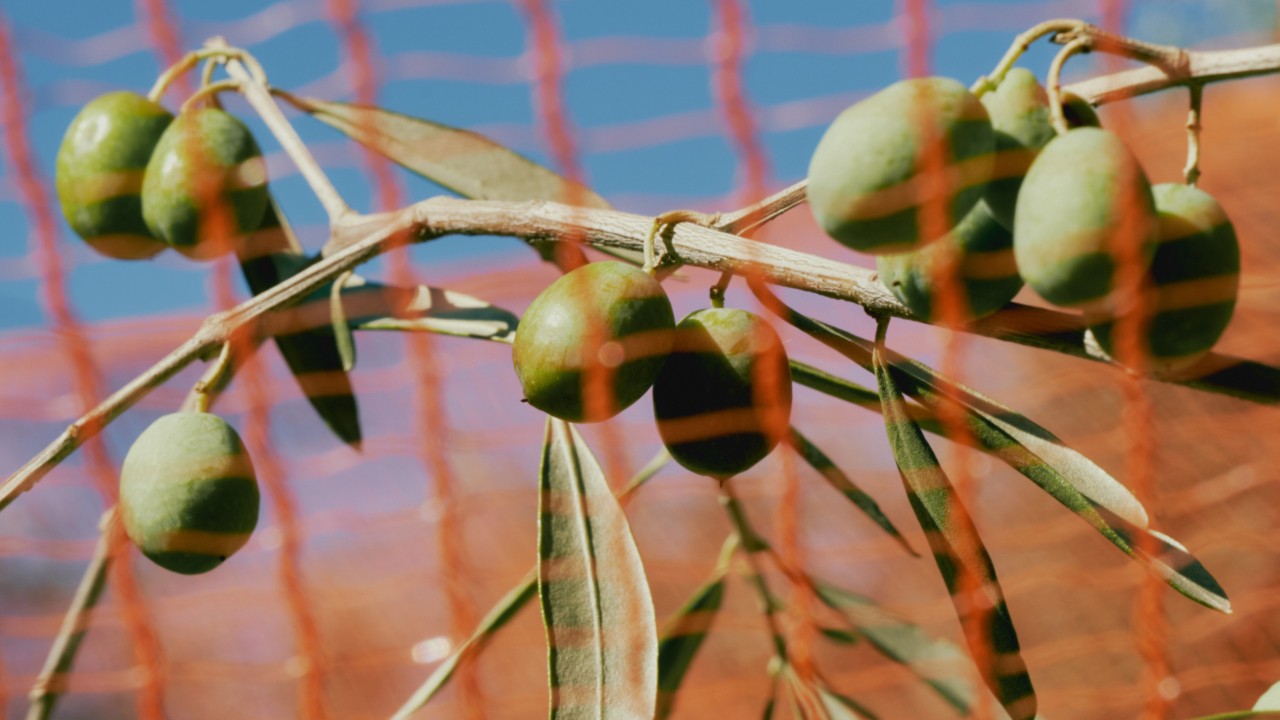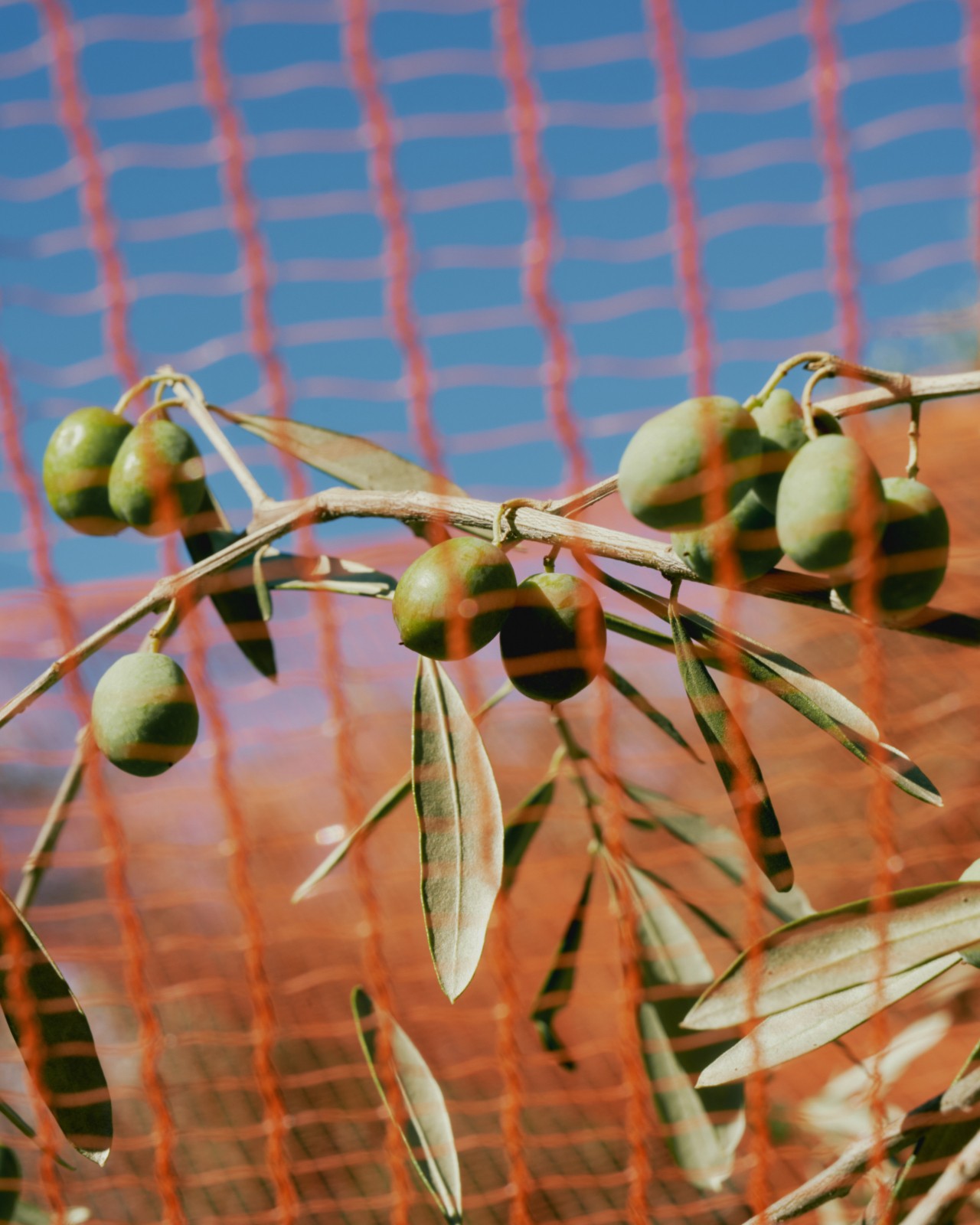

Photograph by Nicolò Rinaldi / Connected Archives
WORDS BY PALOMA DUPONT DE DINECHIN
Salah Abu Ali, a 50-year-old Palestinian farmer, loves his millennia-old olive tree—so much so that his wife is jealous of the time he spends with it. On his land in the village of Al Walaja, on the outskirts of Bethlehem in the illegally occupied West Bank, Salah tends around 150 olive trees, but this one is particularly special. It’s “the most beautiful in the world,” he said.
The tree towers nearly 43 feet high, boasts a circumference of 82 feet, and casts a shadow of 2,600 square feet—the same footprint as the average American home. Italian scientists in 2012 estimated its age to be between 4,000 and 5,000 years old.
Salah can’t say anything bad about his olive tree. He considers it a member of his family. The father of four even named a branch after his youngest son, Ibrahim, aged 6. “My son was born, and the branch began growing that very day,” he confided, visibly moved. His tenderness for the tree has led him to coin nicknames for it, such as Al Khetiara (“the wise old woman”), Em Al-Zaytoun (“the mother of olives”), and Arous Falsteen (“the bride of Palestine”).
This deep attachment to an olive tree is rooted in Salah’s painful history. His father put down roots beside it during the Nakba, the mass displacement and dispossession of Palestinians during the 1948 Arab-Israeli war. Like hundreds of others, he and his family were forced from the old village of Al Walaja when it was seized by Israeli forces and divided in two in a 1949 agreement. Salah’s father found refuge on the other side of a nearby hill. More than 75 years later, Salah, from his olive grove, directed my attention beyond an iron fence he is forbidden from crossing that still divides the territory: first to the exact location of the old community school; then to his family home. Both are now in ruins.
The village of Al-Walaja today is surrounded by the Jewish Quarter of Jerusalem to the north and the illegal settlements of Gilo and Har Gilo to the east. When the separation barrier was built a few hundred feet away starting in 2007, Salah felt the ground tremble. “It’s impressive when you think of all he’s survived,” he said of the tree, a silent witness to their history and a pillar of their resilience and identity—now in an age of intensifying Israeli settler violence more than ever.
Salah’s ancient olive tree has a magnetic pull on his family, especially between October and November during harvest season, which provides income for nearly 100,000 families. Salah’s ancient plant is exceptional in this regard. It yields nearly half a ton of fruit each year—as many as 25 of its younger counterparts combined—which Salah called a “blessing.”
The harvest itself is a full family affair. Last year, it fell on November 15—a Friday, the holy day of worship for Muslims. Around 20 members of Salah’s family gathered at dawn. Salah pruned the branches for a more abundant crop in the future while the women combed them with their fingers to recover the fruit and other men perched on ladders, shaking the branches to dislodge the fruit onto large black tarpaulins.
One of those men was Salah’s 55-year-old cousin Mahmoud Abu Ali, who has traveled to Saudi Arabia and Jordan for work and to Egypt to treat his throat cancer. Still, “I always return to Palestine,” Mahmoud said proudly. “This tree planted here, you imagine the roots it must have, and, well, my roots are just as deep as this land.”
Mahmoud’s daughter Wesam, a 22-year-old computer engineer, echoed that sentiment. “The tree brings us together,” she said. “Even though I work a lot, I always free myself up for the annual harvest; it’s a tradition that connects me to my roots.”
“This tree planted here, you imagine the roots it must have, and, well, my roots are just as deep as this land.”
Those roots spread far and wide, young and old. On harvest day, Wiam, age 9, climbed the towering plant from branch to branch. Under its shade, Wesam helped her 14-year-old cousin Aya review math for an exam the next day. Aya said she “didn’t want to miss this special day, which only comes once a year.” Other teenage girls in the family snapped selfies from the shade below. Parents posed and photographed the youngest relatives, like 2.5-year-old Zacaria, in the hollow of the trunk. It’s an annual tradition that measures their growth.
The pious family paused around 2:30 p.m. for prayer. On jute sacks called kis and used to gather olives, they bowed and prayed. Their connection to olives also has a religious dimension. The Quran says Allah swears “in the name of the fig and olive tree.” For 55-year-old Rabaa, Mahmoud’s cousin, harvesting is a “sacred” act in which she feels “God’s love.”
“The color, the smell, the texture of the olive is something we’ve known since childhood,” she said. “It’s part of us.”
However, a somber shadow loomed over this past harvest. Since October 7, 2023, Israeli settler violence has made the olive harvest a major ordeal for the Palestinians. While settler violence is nothing new, it has intensified. Times of war make life more akin to “survival,” said Mahmoud. With the destruction of life in Gaza, the family savored this moment with simplicity and caution. “We haven’t even celebrated birthdays for over a year now,” Mahmoud confided, his eyes suddenly filled with sorrow.
Now, the situation appears to be worsening. Yesterday, U.S. President Donald Trump lifted sanctions intended to deter violent settlers; hours later, Israel launched a deadly operation in the city of Jenin. The prospects of peace and liberation in the occupied West Bank are more tenuous than ever.
Everything has changed in the region in the past 16 months. Bethlehem used to welcome more than 1 million visitors per year. Some were drawn by the Church of Nativity—the birthplace of Jesus—and some by Salah’s legendary tree. The war slowed tourism to a standstill, Mahmoud said.
Harvesting olives has also become less safe. In the neighboring village of Battir, Khaled Muammar, 56, has always harvested olives with his family. But this year, he had to call on the Israeli organization Rabbis for Peace to help him for the first time. On November 7, the group brought 30 volunteers from various faiths to help with the harvest and serve as a “protective presence,” a role they’ve played for over 20 years. In this region, Israeli settlers from adjacent colonies sow terror. One of the settlers, who is always armed, claims that the road leading to the olive grove is a “road of Abraham” belonging to the Israelis and threatens any Palestinian who dares to use it.
Amid this tension, harvesting olives is no longer profitable. Without support from Palestinian authorities and with tourism paralyzed, Muammar earns far more working in Israeli construction, where he makes about 600 shekels—$164—per day. Yet for him, olives hold a deeper value. “The olive tree knows who planted it—in this case, my grandfather. If you abandon it, it gets depressed,” said Muammar, who still dreams of peaceful coexistence with the Israelis.
For the Rabbis for Peace volunteers who are present, supporting the Palestinians during the olive harvest is essential. A mother and yoga teacher named Tamar Mokady volunteers every year, but the most recent season held a special significance for her. “It’s an act of peace and coexistence,” she said, “a way of saying, You’re not alone. It’s also a way of showing solidarity and gathering around that symbol of peace, the olive tree.”
“The color, the smell, the texture of the olive is something we’ve known since childhood. It’s part of us.”
Rabbis for Peace director Avi Dabush, who has participated in the harvest alongside the Palestinians for 20 years, explained that the aim is to deconstruct the “us versus them narrative.”
“Our children, whatever happens, will live together,” Dabush said. “It’s a light in the darkness and an act of tikkun,” referring to the Hebrew concept of tikkun olam, or repairing the world. Muammar’s olive harvest concluded without incident—but that wasn’t the case everywhere.
The next day, when Rabbis for Peace continued its mission of being a “protective presence” in the Arab village of Deir Jarir in Ramallah, about 20 settlers attacked the volunteers with sticks and stones. Images of the assault showed hooded men beating Palestinian farmers and members of the organization.
In other areas of Bethlehem, Palestinians struggle to access land that legally belongs to them. Landowners like Ibrahim Salameh and his family are required to obtain special permits. Their modest plot of land with 100 old olive trees, once accessible on foot in just 30 minutes from their family home, now lies under a bridge linking Jerusalem to the occupied West Bank. This area is off limits to Palestinians without Israeli papers, except on presentation of a special permit—even for the olive harvest.
Salameh, 36, said the permitting process is convoluted. They must place requests to the Palestinian authorities, who then seek permission from the Israeli authorities. This year, he was granted just two days to collect his olives, but because he stayed two minutes later than the permit allowed on day one, he lost his second day of access. “They’re playing with us. Last year, they gave us the permit when half the olives were already rotting on the ground,” he said.
Accustomed to these restrictions, Salameh, who worked in Florida and holds U.S. citizenship, joked, “It was easier to get into a navy base in the U.S.” His agricultural equipment, including his electric saw, three new ladders, a shovel, and two large new blankets, have remained trapped on the land since day one. He has submitted new permit applications, but they were not approved. “A month has already passed. By now, I assume they’ve probably been stolen,” he said.
As Israeli settlements continue to expand and dispossess Palestinians of their properties and traditions, around their old olive tree, Salah’s family continues to hope. The day before their family harvest, an old olive tree was uprooted and replanted on a roundabout at the entrance of an Israeli settlement, according to the Abu Ali family. The Palestinian Ministry of Agriculture and the Applied Research Institute–Jerusalem estimate that over 800,000 olive trees were uprooted between 1967 and 2011.
“Inshallah, we’ll be free of the Israeli occupation,” Rabaa said. Mahmoud, for his part, invoked a hadith: “If it’s the last day of the world and in your hand, you have a seedling… plant it.”
West Bank’s Ancient Olive Trees Face Their Biggest Threat Yet